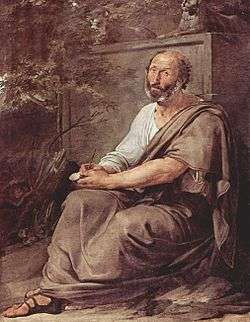Magna Moralia
The Magna Moralia (Latin for "Great Ethics") is a treatise on ethics traditionally attributed to Aristotle, though the consensus now is that it represents an epitome of his ethical thought by a later, if sympathetic, writer. Several scholars have disagreed with this, taking the Magna Moralia to be an authentic work by Aristotle, notably Friedrich Schleiermacher, Hans von Arnim, and J. L. Ackrill. In any case, it is considered a less mature piece than Aristotle's other ethical works, viz. the Nicomachean Ethics, the Eudemian Ethics, and Virtues and Vices. There is some debate as to whether they follow more closely the Eudemian or the Nicomachean version of the Ethics.
 |
| Part of a series on the |
| Corpus Aristotelicum |
|---|
| Logic (Organon) |
| Natural philosophy (physics) |
|
| Metaphysics |
|
|
|
|
[*]: Generally agreed to be spurious [†]: Authenticity disputed |
History of the title
The name "Magna Moralia" cannot be traced further back in time than the reign of Marcus Aurelius. Henry Jackson suggested that the work acquired its name from the fact that the two roles into which it is divided would have loomed large on the shelf in comparison to the eight roles of the Eudemian Ethics, even though the latter are twice as long.[1] The title has been translated to Greek as "Ἠθικὰ Μεγάλα."[2]
Saint Gregory's Commentary on Job is sometimes also referred to by the title Magna Moralia.
Editions
- Losada (Spanish) paperback edition, ISBN 950-03-9305-0
- trans. Taylor (1911), ISBN 0-7661-8801-9
- Harvard University Press hardcover edition (with the Metaphysics), ISBN 0-674-99317-9
- "Magna Moralia" translated by St. George Stock (Internet Archive, 1915)
- Free Audiobook Version of "Magna Moralia" translated by St. George Stock (Librivox)
See also
References
- G. Cyril Armstrong, Introduction to the "Magna Moralia" in Aristotle, Metaphysics X-XIV, Oeconomica, and Magna Moralia, Loeb Classical Library (Cambridge, MA: Harvard University Press, 1947), 427–8.
- Pietro Tomasi, Una nuova lettura dell'Aristotele di Franz Brentano alla luce di alcuni inediti, Editrice UNI Service, 2009, p. 55.
Commentaries
- Magna Moralia. Übersetzt und erläutert von Franz Dirlmeier, Berlin 1958. ISBN 3-05-001193-9
External links

- Magna Moralia public domain audiobook at LibriVox